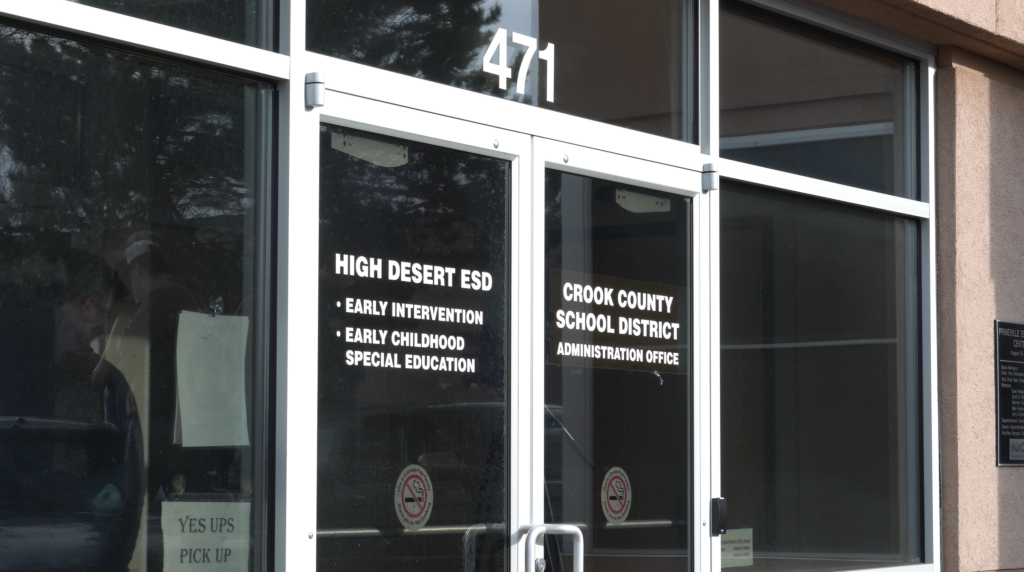
Prineville, Ore. – Just before tonight’s Crook County School District Board’s public meeting, the board released a statement reaffirming that the board’s restriction on comments regarding individual staff members is not a violation of the First Amendment, at least within Oregon.
The policy restricts making comments about staff during public meetings, albeit the board has previously focused on highlighting comments that are critical of staff, raising questions about the constitutionally of the policy which some say is ultimately discriminatory and intended to stifle free speech amid recent controversy.
According to the statement released this afternoon from CCSD Board Chair Jennifer Knight, the public will not be permitted to provide any public comments regarding members of the administration and staff.
“Please note that the board will not hear any comments regarding any individual district staff member,” said Knight.
The statement goes on to say the district’s “BDDH” policy related to public comment is not a constitutional violation, based on legal precedent within the jurisdictions of the US 9th Circuit Court of Appeals (which covers Oregon) and Oregon courts.
“The board has been assured by attorneys from two different organizations that this restriction is not a violation of the First Amendment within the jurisdictions of the 9th Circuit Court of Appeals and the State of Oregon,” read Knight’s statement.
Knight did not indicate which organizations had provided the board with such assurance. You can read the full statement here. We reached out to Rich Simons, the district’s new communications director, who while not answering our question about who the organizations were and what legal citations they may have made, instead seemingly believed we had asked him to personally provide the legal citations.
“I cannot provide any additional details or references because I am not a lawyer and do not provide legal counsel to our board,” said Simons.
We responded by confirming that we were seeking information on the referenced organizations in Knight’s statement and any citations those organizations may have made, not that we had requested for Simons to provide any legal reference. He did not respond further.
While the board now states it will not accept comments about staff regardless of whether it is positive or negative, the board’s previous meeting notices had only indicated that speech critical of district staff was prohibited, making no mention that positive comments were restricted.
Its actual policy seemingly puts more of an emphasis on speech critical of staff (who are considered public officials), which some say still raises clear questions of being truly content-based neutral.
Several sources revealed to the Prineville Review that the policy’s headline itself in the board’s “BDDH” policy document does not appear to be content neutral, reading, “Criticism Regarding Staff Members”.
The policy has a single sentence at the end saying commendations involving a staff member should be sent to the superintendent, which numerous proponents claim only further demonstrates that the policy and method of communication in notices is intended to stifle criticism that is unfavorable to the district.
“A person speaking during the designated portion of the agenda for public comment may offer objective comments of district operations and programs. The Board will not hear comments regarding any individual district staff member. The Board chair will direct the visitor to the procedures in Board policy KL – Public Complaints. Any association contract governing the employee’s rights will be followed. A commendation involving a staff member should be sent to the superintendent who will forward it to the Board.”
The Prineville Review found in numerous past meeting notices over the last year that would only point to the restriction on criticism while making no mention of a restriction of positive comments regarding staff or administration. The standard statement under sections for public comment would typically read, “The board does not hear complaints against any personnel in open session. If you have a complaint about a
specific staff member, please contact the superintendent or the board chair.”
The notice for today’s meeting was similar, but instead was more generic as to comments about school officials, although it only gave direction that it would take complaints via the superintendent and the board chair without mention on where to direct positive commendations:
“Per policy BDDH the Board will not hear comments regarding any individual district staff member. If you have a complaint about a specific staff member, please contact the superintendent or the board chair.”
According to the Congressional Research Service, even content-neutral laws and policies by the government might be considered content-based, according to a January 2023 report provided to Congress.
“Even if a law is content neutral on its face, it might be considered content based if it reflects a discriminatory purpose—that is, if it “cannot be justified without reference to the content of the regulated speech” or was “adopted by the government because of disagreement with the message” conveyed. Reed, 576 U.S. at 164. For example, in 1990, the Supreme Court dismissed a prosecution under a federal statute prohibiting flag burning. The statute did not contain explicit content distinctions, for example, by prohibiting flag burning as a political message but allowing it for other purposes. The Court nonetheless concluded that Congress impermissibly sought to suppress “the communicative impact of flag destruction” in order to preserve “the flag’s symbolic value”—a content-based justification for the law. United States v. Eichman, 496 U.S. 310, 317 (1990).”
The CRS is a public policy research institute of the U.S. Congress that works primarily and directly for its members and congressional committees and staff on a confidential, nonpartisan basis.
While rulings under the 9th Circuit Court of Appeals and the Oregon courts would apply in this situation, rulings from the U.S. Supreme Court would also apply to Oregon and supersede all of the lower federal and state courts.
The Congressional Research Service went on to outline that “A law is facially content based if its text applies to speech based on the subject matter, topic, or viewpoint of that speech.”
We’ve reached out to numerous free speech organizations and legal experts for comment this afternoon but have not heard back before press time. We will update this story with more information if we receive timely responses.
The Board is scheduled to meet this evening in an executive session at 5:30pm, followed by its public session at 6:30pm. Only members of the news media are permitted to attend the executive session.
Among the items being discussed in the executive session is a public meetings grievance filed by this publication in response to the board’s illegal executive session held on Dec. 9th and board members’ claims that our previous release of the content of that executive session was illegal.
Mr. Alderman is an investigative journalist specializing in government transparency, non-profit accountability, consumer protection, and is a subject matter expert on Oregon’s public records and meetings laws. As a former U.S. Army Military Police Officer, he brings a disciplined investigative approach to his reporting that has frequently exposed ethics violations, financial mismanagement, and transparency failures by public officials and agencies.





